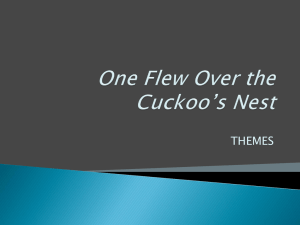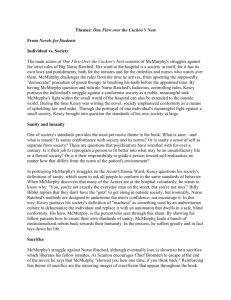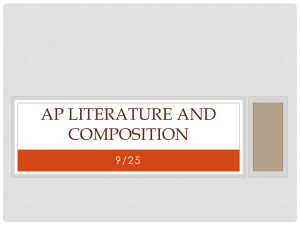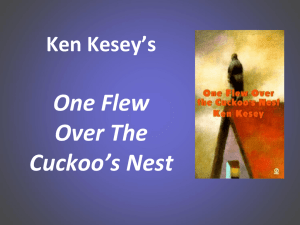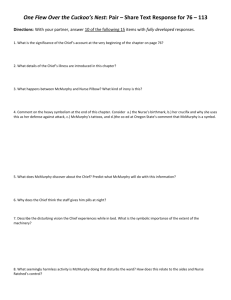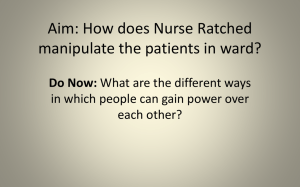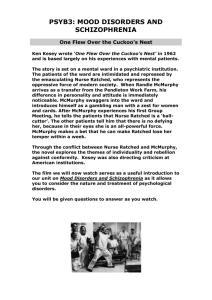Ryan Smith - Reflections on Kosovo
advertisement
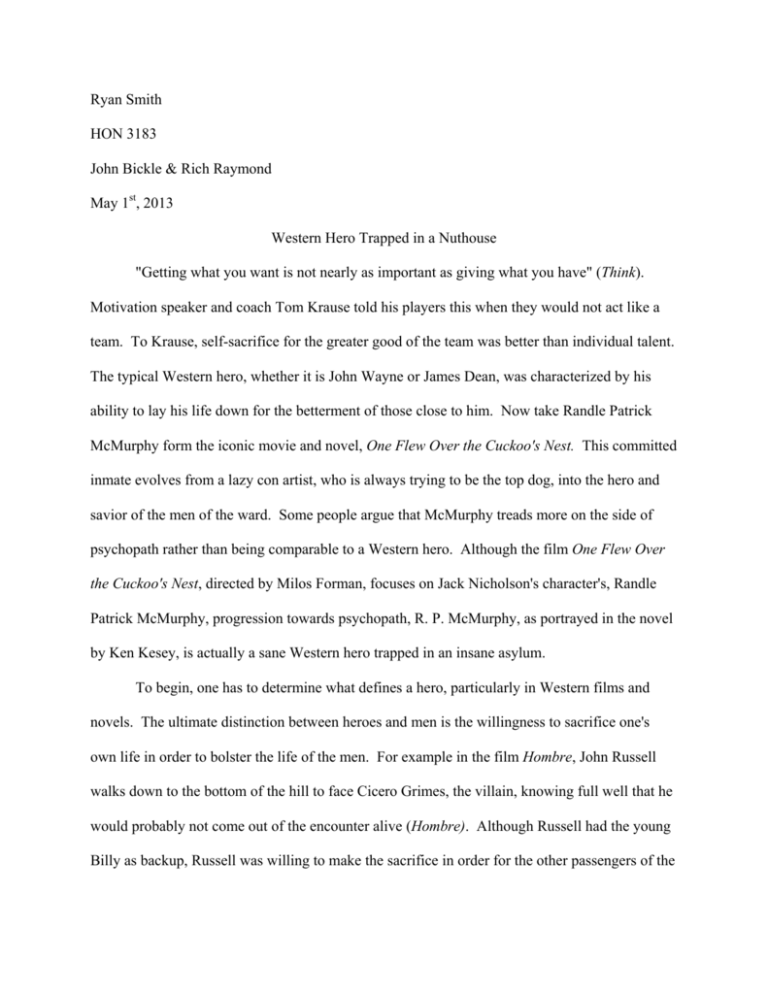
Ryan Smith HON 3183 John Bickle & Rich Raymond May 1st, 2013 Western Hero Trapped in a Nuthouse "Getting what you want is not nearly as important as giving what you have" (Think). Motivation speaker and coach Tom Krause told his players this when they would not act like a team. To Krause, self-sacrifice for the greater good of the team was better than individual talent. The typical Western hero, whether it is John Wayne or James Dean, was characterized by his ability to lay his life down for the betterment of those close to him. Now take Randle Patrick McMurphy form the iconic movie and novel, One Flew Over the Cuckoo's Nest. This committed inmate evolves from a lazy con artist, who is always trying to be the top dog, into the hero and savior of the men of the ward. Some people argue that McMurphy treads more on the side of psychopath rather than being comparable to a Western hero. Although the film One Flew Over the Cuckoo's Nest, directed by Milos Forman, focuses on Jack Nicholson's character's, Randle Patrick McMurphy, progression towards psychopath, R. P. McMurphy, as portrayed in the novel by Ken Kesey, is actually a sane Western hero trapped in an insane asylum. To begin, one has to determine what defines a hero, particularly in Western films and novels. The ultimate distinction between heroes and men is the willingness to sacrifice one's own life in order to bolster the life of the men. For example in the film Hombre, John Russell walks down to the bottom of the hill to face Cicero Grimes, the villain, knowing full well that he would probably not come out of the encounter alive (Hombre). Although Russell had the young Billy as backup, Russell was willing to make the sacrifice in order for the other passengers of the Smith 2 ill-fated stagecoach to return relatively unharmed back to society. Ultimately, Russell paid for their safety with his life. Another example is in the final scenes of the film Shane. Shane, a "retired" hired gun, was forced to knock out his new friend, Joe Starrett, and face the Riker gang and their hired gun (Shane). Shane committed these acts in order to save Joe's life and the livelihood of the other settlers. While Shane was forced to harm the one he was trying to protect, he still made the sacrifice, although it is unclear on whether or not it cost Shane his life. In the film One Flew Over the Cuckoo's Nest, McMurphy appears to only sacrifice himself to get one last shot at Nurse Ratched and to redeem the death of Billy. The climax scene does not convey the magnitude of the effect McMurphy had on the others in the ward with his self-sacrifice. In both the novel and the film, McMurphy had a chance to escape out the window, but instead he attempts to kill Nurse Ratched by wringing her neck (One, Kesey). He knew that in attempting to take Nurse Ratched's life that his was forfeit. McMurphy's self-sacrifice did not result with the loss of his life, but rather the loss of his "sanity." The doctors performed a frontal lobotomy on him in order to "tame" him. Chief Bromden does however end up suffocating McMurphy with a pillow, although the intent was not malicious (One, Kesey). The film downplays the effect McMurphy's final self-sacrifice has on the other men of the ward, because it only shows the escape of Chief Bromden. However in the novel as a direct result of McMurphy's attempt of Nurse Ratched's life, every single one of the Acutes, who are in the mental hospital voluntarily, and Chief Bromden leave to return to the real world they feared until the arrival of McMurphy (Kesey). In the film, McMurphy's sacrifice does not appear to be for any greater good, while in the novel, it is the final boost the men need. The treatments that McMurphy was receiving were taking their toll on him, but he would not let it show to the men of the ward, because they needed to see that McMurphy was winning. "He insisted it wasn't hurting him. He wouldn't even take Smith 3 his capsules. But every time that loudspeaker called for him to forgo breakfast and prepare to walk to Building One, the muscles in his jaw went taut and his whole face drained of color, looking thin and scared "(Kesey 250). Clearly by this point in the novel, McMurphy had fully committed to sacrificing himself in order to free the others from the ward and the reign of Nurse Ratched. Therefore with concerns to the novel, McMurphy possesses the self-sacrifice trait apparent in Western film and novel heroes. Another important figure in regards to self-sacrifice besides Western heroes is Jesus. From the Gospel of Matthew comes the story of Jesus' Sermon on the Mount. Jesus explains the differences between the ways his commandments were interpreted and what they are supposed to mean ("Sermon"). He describes a form of self-sacrifice in such that one should be meek in front of God and always do as God says. Although some have compared the self-sacrificial nature of Western heroes to that of Jesus on the cross, in regards to One Flew Over the Cuckoo's Nest, the character of McMurphy does not sacrifice himself for the reasons Jesus did. McMurphy sacrifices himself in order to free the other men from the ward, because he knows that he has a slim to no chance of ever leaving with Nurse Ratched as the head nurse. Jesus sees through with his crucifixion, because he knows that he will return and in order for him to be an example for the people of Earth. McMurphy's only greater good is the other men of the ward. In the eyes of John Stuart Mill, McMurphy provides a superior example of a utilitarian or consequentalist. While McMurphy does not appear to be actually weighing out all the outcomes of the "Greatest Happiest Principle" (Mill), everything he does is for the other men of the ward. McMurphy can see how miserable the men are under the reign of Nurse Ratched and that they are "not any crazier than the average asshole on the street" (Kesey 58). McMurphy's greater good is trying to get the men of the ward, particularly those who are in the insane asylum voluntarily, to leave. Smith 4 Furthermore, a hero needs to be loved, but at the very least respected, by the people. Shane becomes respected by the settlers when he returns to the tavern and picks a fight with Chris Calloway (Shane). In The Man Who Shot Liberty Valance, Tom Doniphon is loved by the townspeople and respected by the ranchers, Valance included (Man). Even Ranse Stoddard, who is not the typical Western hero whereas Doniphon is, earns the love and respect of the townspeople and eventually the people of the state. Without the love and respect of the people, there would be no such thing as heroes, because heroes can be simplified to leaders with sacrificial tendencies. It is without question that the men of the ward adore McMurphy, if not for his character, then for his ability to disturb Nurse Ratched. One example is the death of Cheswick: "Even Cheswick could understand it and didn't hold anything against McMurphy for not going ahead and making a big fuss over the cigarettes...and that if he'd thought about Mack being committed he'd never have put him on the spot like he had the other day" (Kesey 150-151). If Cheswick did not admire McMurphy, he probably would not have apologized or taken his own life. Furthermore, the men on the ward show their admiration for McMurphy by challenging Nurse Ratched. According to Holse and Roche claim, "in order to be himself, the hero needs something evil to negate" (Holse). In The Man Who Shot Liberty Valance, the hero is Doniphon and his counterpart is Liberty Valance (Man). In Hombre, Russell's evil opponent is Cicero Grimes (Hombre). McMurphy's "evil" counterpart is, without question, Nurse Ratched. Without Nurse Ratched's rules and order, McMurphy probably would not have been such an influence on the men of the ward. McMurphy needed Nurse Ratched, so that he could try to upset her in front of the men, thus loosening them up, eventually to a point where they openly laughed at her. Smith 5 On the other hand, many people consider McMurphy to be simply a psychopath. Even the film appears to depict him as a con artist transforming into a murderous and rash psychopath, particularly in the last couple minutes. Because Forman, the director of One Flew Over the Cuckoo's Nest, chose not to show the full effect of McMurphy's sacrifice, McMurphy's decision to attempt to kill Nurse Ratched seems too far from rational thought processes for him to be considered sane. However in the novel by Kesey, McMurphy enters the insane asylum as an incarcerated con artist, who is trying to get out of hard labor the last few months he has behind bars. Every chance he gets, McMurphy tries to upset Nurse Ratched's order and perfected schedule (Kesey). He even outsmarts the other men of the ward in bets and in games of poker and blackjack. Of course, these are not the traits often associated with heroes. The turning point for when McMurphy fully earns his status as ward hero is when he "ran his hand through the glass" of the nurse's station, claiming he could not see the glass, because it "was so spick and span [he] com-pletely forgot it was there" (Kesey 172). McMurphy now accepts his committed status and knows that he does not have much hope of being released. Everything he does from then on is to help the other men escape the clutches of Nurse Ratched. Additionally, it can be difficult for some to connect McMurphy to the sane Western heroes, because neither the film nor the novel is set in a typical Western setting. Most Westerns happen in some town, usually days from any form of law, in some desert-filled state, such as Arizona or New Mexico, in the middle of America's manifest destiny. One Flew Over the Cuckoo's Nest takes place in a mental hospital in the Pacific Northwest in the early 1960s. Arguably, comparisons between the insane asylum and the Wild West can be made. Both are secluded from the normal, civilized society. Both have a strong sense of community built from time spent together. While not in the typical Smith 6 setting for a classic Western film or novel, McMurphy, in the novel, still relates to the classic Western heroes and is not simply some insane psychopath. Therefore despite the fact that the film One Flew Over the Cuckoo's Nest portrays McMurphy as psychopathic and lacking in the traits of Western heroes, the novel shines a more complete picture of his self-sacrificial character. McMurphy has an "evil" counterpart in Nurse Ratched and is self-sacrificial for the freedom of the men of the ward, unlike the sacrifices made by Jesus. Both are traits of the classic Western hero, despite the fact that they appear in an incarcerated conman trapped in an insane asylum. Smith 7 Works Cited Holse, Vittorio, and Mark W. Roche. "Vico's Age of Heroes and the Age of Men in John Ford's Film 'The Man Who Shot Liberty Valance'" (n.d.): n. pag. CLIO. Web. Winter 1994. Hombre. Screenplay by Irving Ravetch and Harriet Frank, Jr. Dir. Martin Ritt. Twentieth Century Fox. Mar. 21, 1967. Film. Kesey, Ken. One Flew Over the Cuckoo's Nest. New York: Penguin Group Inc, 2003. Print. The Man Who Shot Liberty Valance. Screenplay by James Warner Bellah and Willis Goldbeck. Dir. John Ford. Paramount Pictures. Apr. 22, 1962. Film. Mill, John S. "Utilitarianism." Ed. L. Pojman. Introduction to Philosophy: Classical and Contemporary Readings. N.p.: Wadsworth, 1991. 580-6. Print. One Flew over the Cuckoo's Nest. Screenplay by Lawrence Fletcher and Bo Goldman. Dir. Milos Forman. United Artists. Nov. 19, 1975. Film. "The Sermon on the Mount, The Gospel of Matthew 5-7." English Standard Bible. Print. Shane. Screenplay by A. B. Guthrie. Dir. George Stevens. Paramount Pictures. Apr. 23, 1953. Film. Think Exist. Web. 28 Apr. 2013. <http://thinkexist.com/quotations/self-sacrifice/>.
